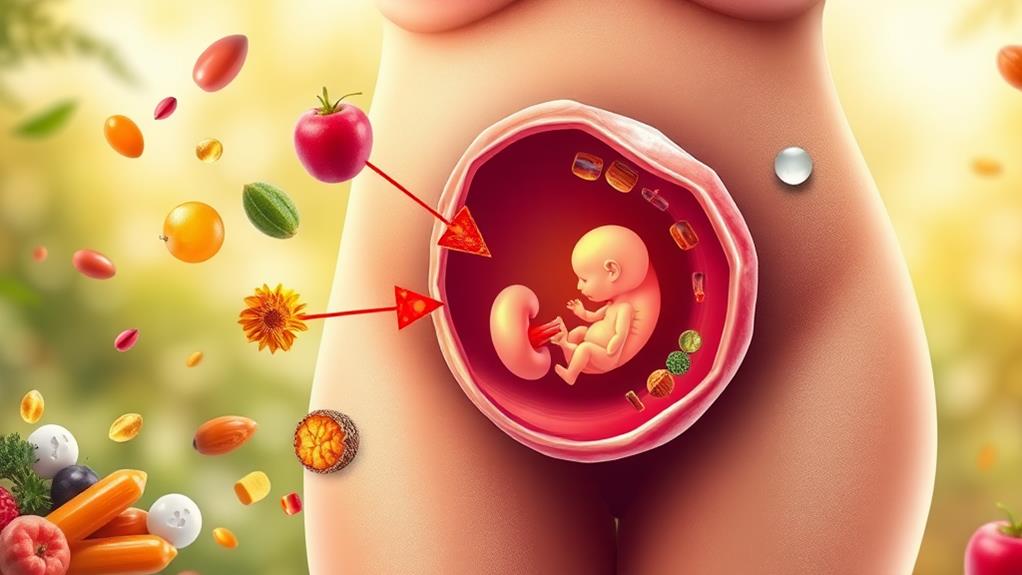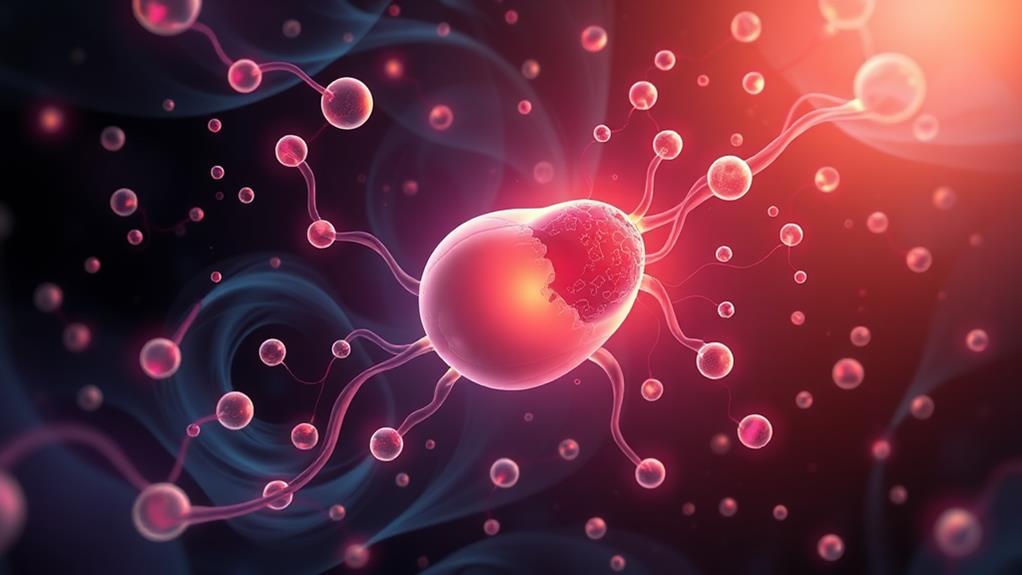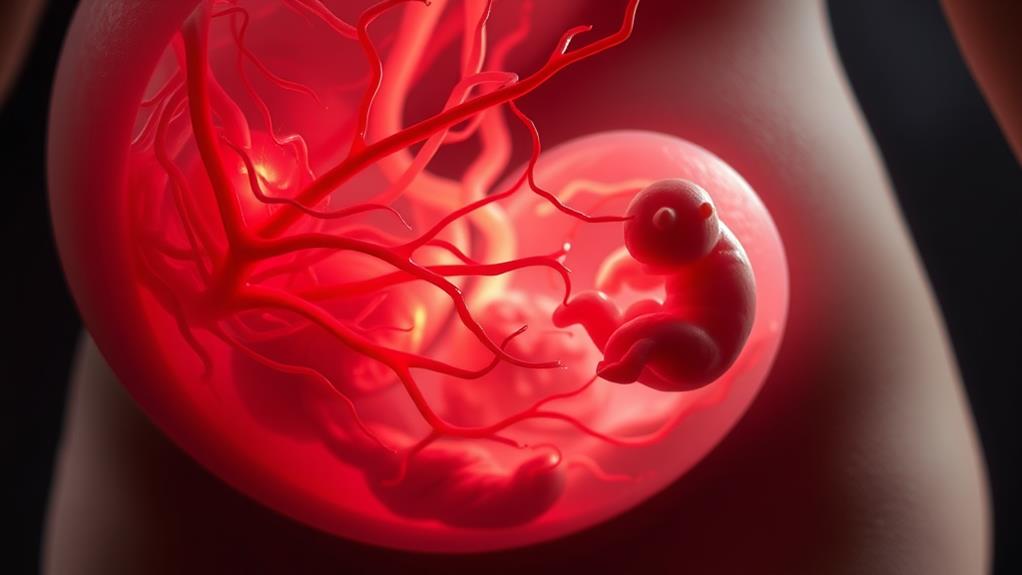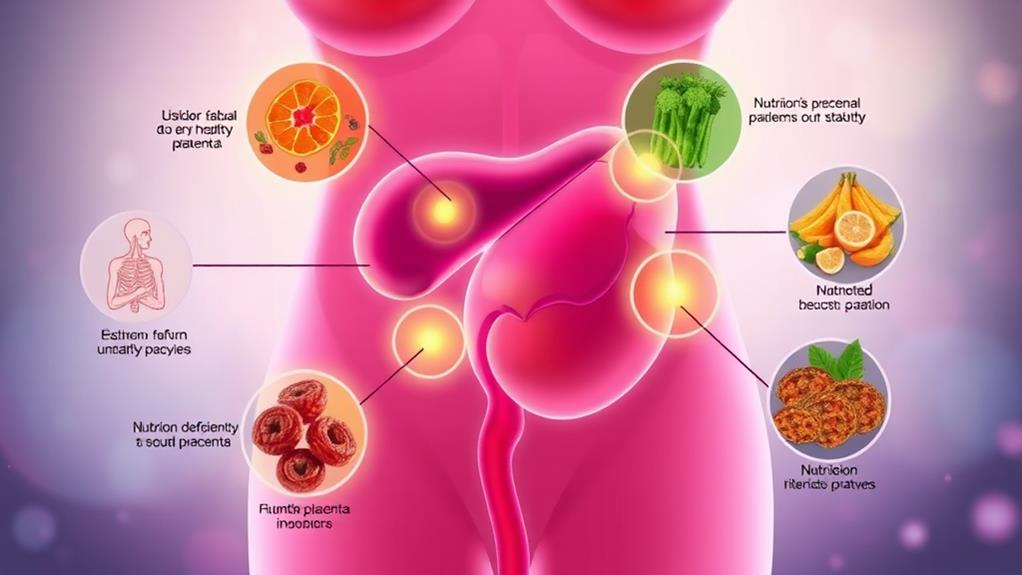Placental Health: 6 Functions & Problems To Watch For
When you’re pregnant, understanding placental health is essential, as it plays a key role in supporting your baby’s development. The placenta’s six primary functions—nutrient transfer, gas exchange, hormonal regulation, immune protection, waste elimination, and overall fetal well-being—are fundamental to a healthy pregnancy. Yet, complications like placenta previa or placental abruption can pose significant risks. Staying informed about these issues can help you recognize warning signs. What should you look out for, and how can you guarantee everything’s on track?
Nutrient Transfer

Nutrient transfer is essential for fetal development, as the placenta acts as the lifeline between you and your growing baby. Think of it as a super-efficient delivery service! The placenta helps move all the good stuff, like vitamins, minerals, and oxygen, straight to your little one. It’s like a magical highway where nutrients zoom to their destination, making sure your baby has everything it needs to grow strong and healthy.
But wait, there’s more! This nutrient transfer isn’t just about food; it’s also about keeping waste products from piling up. Your placenta makes sure that your baby doesn’t get stuck with things it shouldn’t have, like carbon dioxide. Pretty neat, right?
You might be wondering how all this happens. Well, it’s all about the blood. Your blood flows into the placenta, where it meets your baby’s blood in a special way. They don’t mix, but they share nutrients through a barrier. This allows your baby to get all the essentials without any of the yucky stuff.
Gas Exchange
While nutrient transfer keeps your baby nourished, gas exchange plays an essential role in guaranteeing it can breathe, even before birth. The placenta acts like a superhero, swooping in to make sure your little one gets the oxygen it needs. It’s pretty amazing how it works!
Your blood carries oxygen from your lungs, and the placenta transfers that oxygen to your baby’s blood. At the same time, it helps remove carbon dioxide, which is like a waste product from breathing.
Think of it as a tiny, efficient delivery service, racing back and forth. This exchange happens in the tiny blood vessels of the placenta, where oxygen and carbon dioxide switch places. It’s all about teamwork!
If there are any problems with gas exchange, it can affect your baby’s growth and overall health. That’s why keeping an eye on placental health is so important. Regular check-ups can help catch any issues early.
Hormonal Regulation

Progesterone helps thicken the uterine lining, making it cozy for your baby, while estrogen supports blood flow and helps with the growth of the placenta itself.
It’s like a team effort, and each hormone has a specific job to do. When everything’s running smoothly, you feel more energetic and less cranky. But if hormone levels are off, you might notice some challenges.
For example, low progesterone can lead to complications that might make you feel anxious.
It’s important to keep an eye on your body and discuss any concerns with your doctor. They can help you navigate this hormonal dance so you and your baby stay healthy.
Immune Protection
The placenta plays an essential role in providing immune protection for both you and your developing baby. Think of it as a superhero, fighting off unwanted germs and infections. It acts as a barrier, making certain that harmful substances can’t easily reach your baby. Isn’t that amazing?
One of the key ways the placenta does this is by producing special proteins called antibodies. These antibodies help your baby’s immune system learn to fight off illnesses. When your body encounters germs, it creates these antibodies, and some are passed to your baby through the placenta. This means your little one gets a head start on building their defense.
However, not everything is smooth sailing. Sometimes, the placenta mightn’t work as well as it should, which can leave your baby vulnerable.
That’s why keeping an eye on your placental health is super important. Regular check-ups and talking to your doctor can help guarantee that everything’s on track.
Waste Elimination

Through its intricate network of blood vessels, the placenta efficiently handles waste elimination for both you and your developing baby. It acts like a super-cleaning service, whisking away carbon dioxide and other waste products your baby creates. While you might imagine tiny janitors at work, it’s really just the placenta doing its amazing job!
As your baby grows, it produces waste that needs to be removed. The placenta takes this waste and sends it back into your bloodstream. From there, your body can safely dispose of it, mostly through your kidneys and into your urine. It’s pretty impressive how this system works without you even thinking about it!
You might wonder what happens if there’s a problem with waste elimination. Well, that’s where things can get tricky, but don’t worry for now! For most pregnancies, the placenta keeps things running smoothly, like a well-oiled machine.
Just remember to take care of yourself—stay hydrated and eat nutritious foods! Your body and your placenta will thank you. After all, a happy placenta means a happy baby! So, keep that positive energy flowing while your incredible body does its job!
Common Placental Problems
When it comes to placental health, several common problems can arise during pregnancy.
One major issue is placenta previa, where the placenta covers the cervix. This can lead to bleeding and might require a C-section.
Another problem is placental abruption, which happens when the placenta separates from the uterus too early. This can cause pain and bleeding, and it’s essential to get medical help right away.
You might also encounter gestational trophoblastic disease, where abnormal cells grow in the placenta. While it sounds scary, doctors have effective treatments.
Then there’s placenta accreta, where the placenta attaches too deeply into the uterine wall. This can complicate delivery, so your doctor will monitor it closely.
Lastly, some women face low placental function, impacting nutrient and oxygen transfer to the baby.
If you notice unusual symptoms, like severe pain or heavy bleeding, don’t hesitate to reach out to your healthcare provider.




